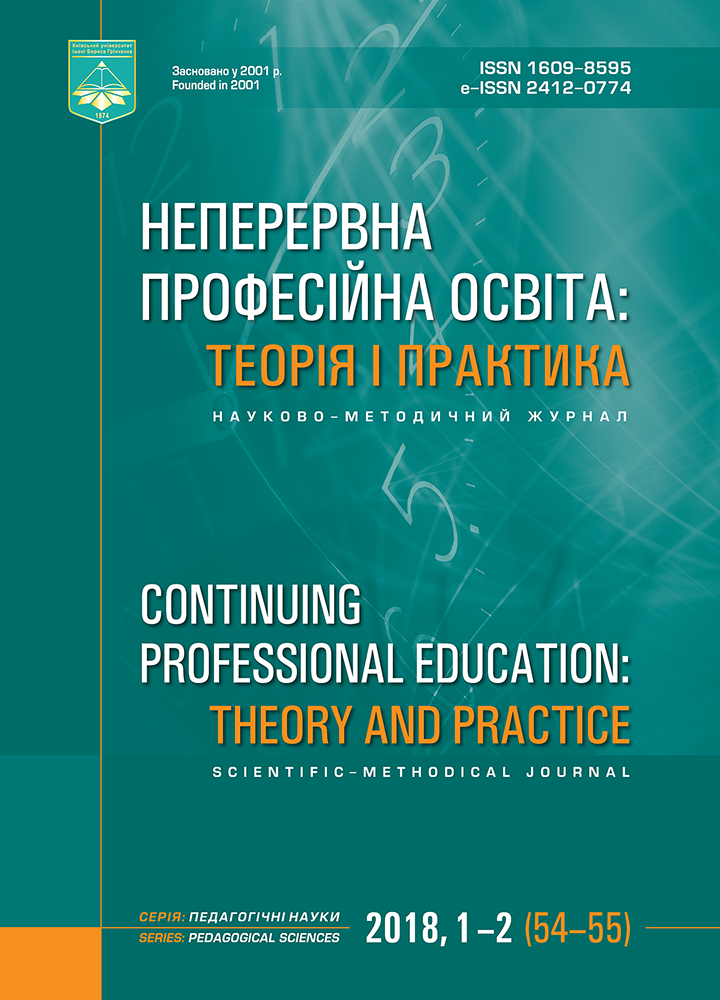CONCEPT OF COMPETENCE IN THE INTERNATIONAL AND NATIONAL EDUCATIONAL CONTEXTS
DOI:
https://doi.org/10.28925/1609-8595.2018(1-2)715Keywords:
competence, competency, competent performance, educational contexts, knowledge, skills.Abstract
This paper explores the problem of harmonization of educational thesaurus which requires urgent attention in the process of creating European Higher Education Area and developing of common educational standards. All policy documents, the reports of the European Council and guidliances contain key educational terms that require proper understanding and interpretation in both the member states and in countries that are at the stage of European integration. The paper also reviews the issue of the coordination of international educational thesaurus with the national one, what raises the question if it is possible to unify educational terminology in Europe and beyond? Besides, the authors make an overview of the genesis of the competence movement in the EU, the USA, Australia and Ukraine to evaluate this question. It has become evident that there is still considerable misunderstanding of the integrated approach to concepts of competence and competency. These definitions are found to be too broad, abstract and general and not unified for higher education both on international and national levels.References
Allen, J., Ramaeker, G., & van der Velden, R. (2005). Measuring Competencies of Higher Education Graduates. New Directions for Institutional Research, 126, 49–59. Retrieved from http://www.researchgate.net/publication/227669654_Measuring_competencies_of_higher_education_graduates (eng).
Banta, T. W. (2001). Assessing competence in higher education. Assessing student competence in accredited disciplines: Pioneering approaches to assessment in higher education, 1–12. Retrieved from https://cms.bsu.edu/-/media/WWW/DepartmentalContent/Effectiveness/pdfs/LendingLibrary/AssessingCompetence.pdf (eng).
Choudaha, R. (2008). Competency-Based Curriculum for a Master’s Program in Service (SSME): an Online Delphi Study. Doctor’s thesis. Retrieved from https://digitalcommons.du.edu/cgi/viewcontent.cgi?article=1127&context=etd (eng).
Kremen, V. H. (Ed.). (2008). Entsyklopediia osvity [Encyclopedia of Education]. Kyiv, Ukraine: Yurinkom Inter (ukr).
Busel, V. T. (Ed.). (2005). Velykyi tlumachnyi slovnyk suchasnoi ukrainskoi movy [Great Dictionary of Modern Ukrainian]. Kyiv, Irpin, Ukraine: Perun (ukr).
Hager, P., Gonczi, A., & Athanasou, J. (1994). General Issues about Assessment of Competence. Assessment & Evaluation in Higher Education, 19 (1), 3–16. Retrieved from https://www.tandfonline.com/doi/abs/10.1080/0260293940190101 (eng).
Hutorskoy, А. (2003). Klyuchevyie kompetentsii kak komponent lichnostno-orientirovannoy paradigmy obrazovaniya [Key competences as a component of personality-oriented educational paradigm]. Narodnoe obrazovanie, 2, 60–64 (rus).
Zakon Ukrainy «Pro vyshchu osvitu» [Law on Higher Education in Ukraine] (2014). Retrieved from http://zakon4.rada.gov.ua/laws/show/1556-18 (ukr).
Longman Exam Dictionary (2006). Wilmington, USA: Pearson Education Limited (eng).
Mulder, M., Gulikers, J., Wesselink, R., & Biemans, H. (2009). The new competence concept in higher education: error or enrichment? Journal of European Industrial Training, vol. 33, № 8/9, 755–770. Retrieved from http://www.mmulder.nl/PDF%20files/2008-03-31%20Paper%20Mulder%20AERA%202008.pdf (eng).
Modeling and Measuring Competencies in Higher Education. Tasks and Challenges (2013). Retrieved from https://www.sensepublishers.com/media/1531-modeling-and-measuring-competencies-in-higher-education.pdf (eng).
Oliver, В. (1990). Defining Competence: The Case of Teaching. Journal of Teaching in Physical Education, 9, 184–188. Retrieved from https://journals.humankinetics.com/doi/abs/10.1123/jtpe.9.3.184 (eng).
Ott, M., Baca, E., Cisneros, J., & Bates, E. (2014). A competency-based approach to the master’s degree preparation of higher education professionals. Journal of Case Studies in Accreditation and Assessment, 4, 1–19. Retrieved from http://www.aabri.com/manuscripts/141948.pdf (eng).
Rashkevych, J. M. (2014). Bolonskiy protses ta nova paradigma vischoyi osviti: monografIya [The Bologna Process and the New Paradigm of Higher Education: monografy]. Lviv, Ukraine: Vidavnitstvo Lvivskoyi politehniki (ukr).
Slavík, M. (2008). Teachers’ Competences. Retrieved from http://www.slideshare.net/gueste538c3/teachers-competences (eng).
Universities’ contribution to the Bologna process. Tuning Project (2008). Retrieved from http://www.unideusto.org/tuningeu/images/stories/Publications/ENGLISH_BROCHURE_FOR_WEBSITE.pdf (eng).
Van der Klink, M. R., & Boon, J. (2002). The investigation of competencies within professional domains. Human Resource Development International, 5(4), 411–424 (eng).
Zymnyaya, I. A. (2004). Klyuchevyie kompetentnosti kak rezultativno-tselevaya osnova kompetentnostnogo podhoda v obrazovanii [Key Competence as Effectively-targeted Basis of Competence Approach in Education]. Moscow, Russia: Issledovatelskiy tsentr problem kachestva podgotovki spetsialistov (rus).
Downloads
How to Cite
Issue
Section
License
Copyright (c) 2020 Svitlana Sysoieva, Natalia Mospan

This work is licensed under a Creative Commons Attribution-NonCommercial 3.0 Unported License.



